1995年大学日语四级考试试题和答案(除听力外)
日语四级考试
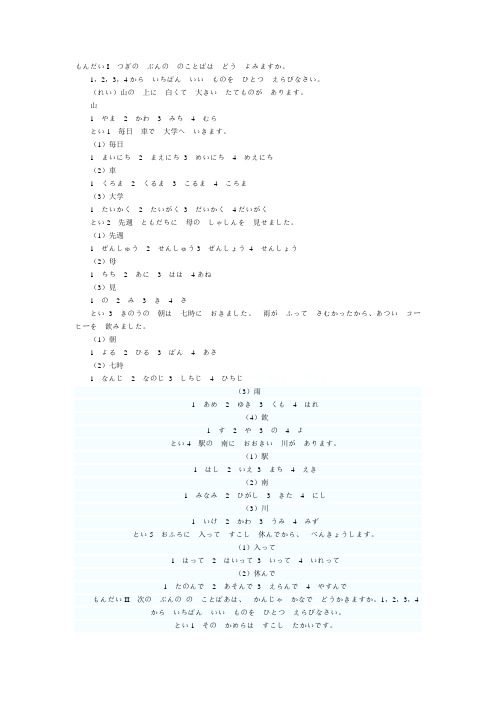
もんだいIつぎのぶんののことばはどうよみますか。
1,2,3,4からいちばんいいものをひとつえらびなさい。
(れい)山の上に白くて大きいたてものがあります。
山1やま2かわ3みち4むらとい1毎日車で大学へいきます。
(1)毎日1まいにち2まえにち3めいにち4めえにち(2)車1くろま2くるま3こるま4ころま(3)大学1たいかく2たいがく3だいかく4だいがくとい2先週ともだちに母のしゃしんを見せました。
(1)先週1ぜんしゅう2せんしゅう3ぜんしょう4せんしょう(2)母1ちち2あに3はは4あね(3)見1の2み3き4さとい3きのうの朝は七時におきました。
雨がふってさむかったから、あついコーヒーを飲みました。
(1)朝1よる2ひる3ばん4あさ(2)七時1なんじ2なのじ3しちじ4ひちじ来源:考试大-小语种考试(3)雨1あめ2ゆき3くも4はれ(4)飲1す2や3の4よとい4駅の南におおきい川があります。
(1)駅1はし2いえ3まち4えき(2)南1みなみ2ひがし3きた4にし(3)川1いけ2かわ3うみ4みずとい5おふろに入ってすこし休んでから、べんきょうします。
(1)入って1はって2はいって3いって4いれって(2)休んで1たのんで2あそんで3えらんで4やすんでもんだいII次のぶんののことばあは、かんじゃかなでどうかきますか。
1,2,3,4からいちばんいいものをひとつえらびなさい。
とい1そのかめらはすこしたかいです。
(1)すこし1示し2小い3少し4不し(2)たかい1長い2高い3多い4安いとい2ドアのみぎにでんきにすいっちがあります。
(1)みぎ1右2石3後4戸(2)でんき1電気2天気3電器4電機(3)すいっち1スイッテ2ネイッテ3スイッチ4ヌイッチとい3いつもここでしんぶんをかいます。
(1)しんぶん1新文2新分3新聞4新本(2)か1員2貿3貸4買とい4らいげつのむいかにともだちがきます。
来源:考试大-小语种考试责编:xyq 评论纠错(1)むいか1 八日2九日3三日4六日(2)き1来2木3気4行もんだいIII次のぶんの()のところになにをいれますか。
1995年日语四级考试试题
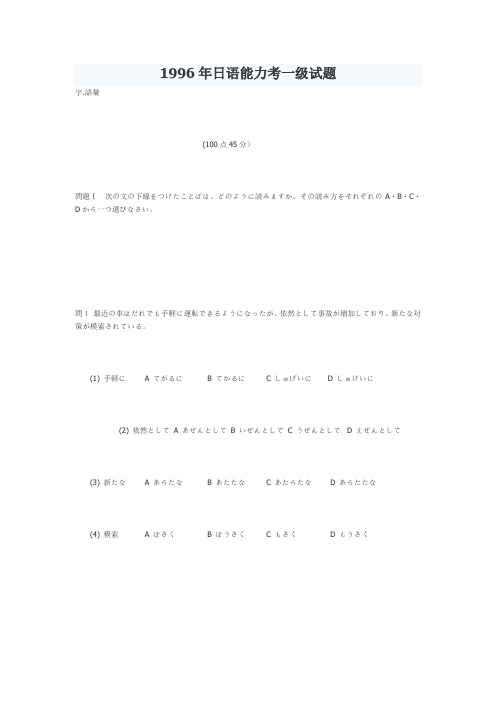
1996年日语能力考一级试题字.語彙(100点45分)問題Ⅰ次の文の下線をつけたことばは、どのように読みますか。
その読み方をそれぞれのA・B・C・Dから一つ選びなさい。
問1最近の車はだれでも手軽に運転できるようになったが、依然として事故が増加しており、新たな対策が模索されている。
(1) 手軽に A てがるに B てかるに C しゅげいに D しゅけいに(2) 依然として A あぜんとしてB いぜんとしてC うぜんとして D えぜんとして(3) 新たな A あらたな B あたたな C あたらたな D あらたたな(4) 模索 A ぼさく B ぼうさく C もさく D もうさく問2その仕事は趣味と実益を兼ねるような仕事なので、採用時の審査が厳しいにもかかわらず応募する人が多い。
(5) 兼ねる A つらねる B かさねる C かねる D こねる(6) 審査 A ばんさ B そうさ C かんさ D しんさ(7) 厳しい A きびしい B はげしい C いさましい D たのもしい(8) 応募 A のうぼう B おうぼう C おうぼ D のうぼ問3長年にわたる支配体制が足元から崩れはじめたのは、自らの政治的腐敗を省みなかった当然の結果であった。
(9) 崩れ始めた A つぶれはじめた B こわれはじめたC たおれはじめるD くずれはじめる(10) 自ら A みずから B かれら C われる D もっぱら(11) 腐敗 A ふうばい B ふっぱい C ふはい D ふばい(12) 省みなかった A かえりみなかった B もどりみなかったC こころみなかったD はぶきみなかった問4男女の雇用条件の格差は是正されつつある。
(13) 雇用Aさいよう B こうよう C さんよう D こよう(14) 格差 A かくさ B きゃくさ C らくさ D こうさ(15) 是正 A ぜっせい B ぜっしょう C ぜせい D ぜしょう問題Ⅱ次の文の下線をつけたことばは、ひらがなでどう書きますか。
大学日语四级练习题1
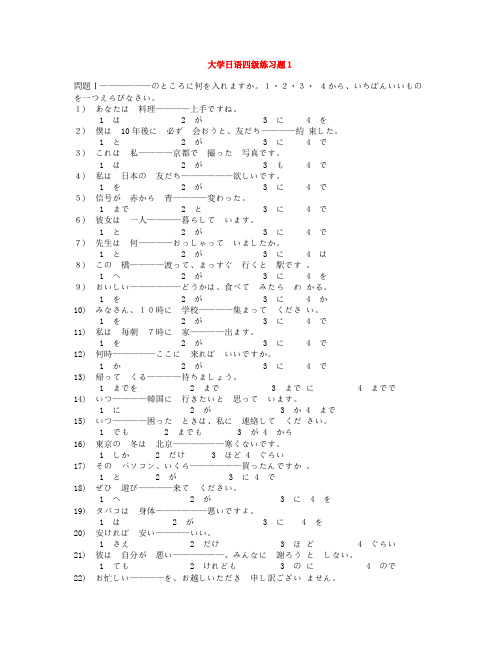
大学日语四级练习题1問題Ⅰ——————のところに何を入れますか。
1・2・3・4から、いちばんいいものを一つえらびなさい。
1) あなたは料理————上手ですね。
1 は2 が3 に4 を2) 僕は10年後に必ず会おうと、友だち————約束した。
1 と2 が3 に4 で3) これは私————京都で撮った写真です。
1 は2 が3 も4 で4) 私は日本の友だち——————欲しいです。
1 を2 が3 に4 で5) 信号が赤から青————変わった。
1 まで2 と3 に4 で6) 彼女は一人————暮らしています。
1 と2 が3 に4 で7) 先生は何————おっしゃっていましたか。
1 と2 が3 に4 は8) この橋————渡って、まっすぐ行くと駅です。
1 へ2 が3 に4 を9) おいしい——————どうかは、食べてみたらわかる。
1 を2 が3 に4 か10) みなさん、10時に学校————集まってください。
1 を2 が3 に4 で11) 私は毎朝7時に家————出ます。
1 を2 が3 に4 で12) 何時—————ここに来ればいいですか。
1 か2 が3 に4 で13) 帰ってくる————待ちましょう。
1 までを2 まで3 までに4 までで14) いつ————韓国に行きたいと思っています。
1 に2 が3 か4 まで15) いつ————困ったときは、私に連絡してください。
1 でも2 までも3 が4 から16) 東京の冬は北京——————寒くないです。
1 しか2 だけ3 ほど4 ぐらい17) そのパソコン、いくら——————買ったんですか。
1 と2 が3 に4 で18) ぜひ遊び————来てください。
1 へ2 が3 に4 を19) タバコは身体——————悪いですよ。
1 は2 が3 に4 を20) 安ければ安い————いい。
1 さえ2 だけ3 ほど4 ぐらい21) 彼は自分が悪い——————、みんなに謝ろうとしない。
1995年6月四级真题及答案

1995年6月四级真题及答案Part I Listening Comprehension (20 minutes)Section A1. (A) Librarian and student. (C) Boss and secretary.(B) Operator and caller. (D) Customer and repairman.2. (A) Look for the key. (C) Fix a shelf.(B) Repair the car. (D) Paint a shelf.3. (A) To make the woman angry. (C) David is the man#39;s good friend(B) To please the man#39;s mother. (D) David is good at carrying on conversations.4. (A) He must meet his teacher. (C) He must go out with his girlfriend.(B) He must attend a class. (D) He must stay at school to finish his homework.5. (A) he wants to pay. (C) He wants to eat somewhere else.(B) he doesn#39;t want to eat out. (D) He doesn#39;t like Japanese food.6. (A) he didn#39;t work as hard as he was supposed to. (C) He did better in an earlier exam.(B) He didn#39;t pass the physics exam. (D) he found something wrong with the exam.7. (A) He is attending his sick mother at home. (C) He is at home on sick leave.(B) He is on a European tour with his mother. (D) He is in Europe to see his mother.1. (A) They don#39;t know how to get to Mike#39;s home. (C) They went to the same party some time ago.(B) They are discussing when to meet again. (D) They will goto Mike#39;s birthday party.9. (A) Five lessons. (C) Twelve lessons.(B) Three lessons. (D) Fifteen lessons.10. (A) Find a larger room. (C) Buy two bookshelves.(B) Sell the old table. (D) Rearrange some furniture.Section BPassage OneQuestions 11 to 13 are based on the passage you have just heard.11. (A) Courses in British history. (C) Courses in sports.(B) Language courses. (D) Teacher training courses.9. (A) T o attract more students.(B) To make the courses suitable for students of all levels.(C) To let the students have a good rest.(D) To make the summer school more like a holiday.10. (A) Because they all work very hard.(B) Because their teachers are all native speakers of English.(C) Because they learn not only in but also out of class.(D) Because they are all advanced students.Passage TwoQuestions 14 to 16 are based on the passage you have just heard.17. (A) Chemicals. (C) Water.(B) Vapor. (D) Gas.18. (A) By passing steam over dry ice. (C) By heating dry ice.(B) By turning ordinary ice into steam. (D) By mixing dry ice with ordinary ice.19. (A) It takes a longer time to melt. (C) It is cleaner to use than ordinary ice.(B) It is lighter to carry. (D) It is not so cold as ordinary ice.20. (A) In the 1920#39;s. (C) In the 1940#39;s.(B) In the 1930#39;s. (D) In the 1950#39;s.Part II Reading Comprehension (35 minutes)Passage OneQuestions 21 to 25 are based on the following passage.Researchers have established that when people are mentally engaged, biochemical changes occur in the brain that allow it to act more effectively in cognitive (认知的) areas such as attention and memory. This is true regardless of age.People will be alert (警觉的) and receptive (接受能力强的) if they are faced with information that gets them to think about things they are interested in. And someone with a history of doing more rather than less will go into old age more cognitively sound than someone who has not had an active mind.Many experts are so convinced of the benefits of challenging the brain that they are putting, the theory to work in their own lives. "The idea is not necessarily to learn to memorize enormous amounts of information." says James Fozard, associate director of the national Institute on Aging. "Most of us don#39;t need that kind of skill. Such specific training is of less interest than being able to maintain mental alertness." Fozard and others say they challenge their brains with different mental skill, both because they enjoy them and because they are sure that their range of activities will help the way their brains work.Gene Cohen, acting director of the same institute, suggests that people in their old age should engage in mental and physical activities individually as well as in groups. Cohen says that we are frequently advised to keep physically active as we age, but older people need to keep mentally active as well. Those who do are more likely to maintain their intellectual abilities and to begenerally happier and better adjusted. "The point is, you need to do both," Cohen says. "Intellectual activity influences brain-cell health and size."21. People who are cognitively healthy are those _____.(A) who can remember large amounts of information (C) whose minds are alert and receptive(B) who are highly intelligent (D) who are good at recognizing different sounds22. According to Fozard#39;s argument people can make their brains work more efficiently by _____.(A) constantly doing memory work (C) going through specific training(B) taking part in various mental activities (D) making frequent adjustments23. The findings of James and other scientists in their work _____.(A) remain a theory to be further proved (C) have been challenged by many other experts(B) have been generally accepted (D) are practiced by the researchers themselves24. Older people are generally advised to _____.(A) keep fit by going in for physical activities(B) keep mentally active by challenging their brains(C) maintain mental alertness through specific training(D) maintain a balance between individual and group activities25. What is the passage mainly about?(A) How biochemical changes occur in the human brain.(B) Why people should keep active not only physically but also mentally.(C) How intellectual activities influence brain-cell health.(D) Why people should receive special mental training as they age.Passage TwoQuestions 26 to 30 are based on the following passage.Attention to detail is something everyone can and should do--especially in a tight job market. Bob Crossley, a human-resources expert notices this in the job applications that come across his desk every day. "It#39;s amazing how many candidates eliminate themselves." he says.Resume (简历) arrive with stains. Some candidates don#39;t bother to spell the company#39;s name correctly. Once I see a mistake, I eliminate the candidate," Crossley concludes. "If they cannot take of these details, why should we trust them with a job?"Can we pay too much attention to detail? Absolutely. Perfectionists struggle over little things at the cost of something larger they work toward, "To keep from losing the forest for the trees", says Charles Garfield, associate professor at the University of California, San Francisco, "We must constantly ask ourselves how the details we#39;re working on fit into the larger picture. If they don#39;t, we should drop them and move to something else".Garfield compares this process to his work as a computer scientist at NASA. "The Apollo II moon launch was slightly off-course 90 percent of the time." Says Garfield, "But a successful landing was still likely because we knew the exact coordinates of our goal. This allowed us to make adjustments as necessary." Knowing where we want to go helps us judge the importance of every task we undertake.Too often we believe what accounts for others#39; success is some special secret or a lucky break (机遇). But rarely is success so mysterious. Again and again, we see that by doing little things within our grasp well, large rewards follow.26. According to the passage, some job applicants were rejected _____.(A) because of their carelessness as shown in their failure to present a clean copy of a resume(B) because of their inadequate education as shown in their poor spelling in writing a resume(C) because they failed to give detailed description of their background in their applications(D) because they eliminated their names from the applicants#39; list themselves27. The word "perfectionists" (para. 3, Line) refers to those who _____.(A) demand others to get everything absolutely right(B) know how to adjust their goals according to the circumstances(C) pay too much attention to details only to lose their major objectives(D) are capable of achieving perfect results in whatever they do28. Which of the following is the author#39;s device to the reader?(A) Although too much attention to details may be costly, they should not be overlooked(B) Don#39;t forget details when drawing pictures(C) Be aware of the importance of a task before undertaking it(D) Careless applicants are not to be trusted29. The example of the Apollo II moon launch is given to illustrate that _____.(A) minor mistakes can be ignored in achieving major objectives(B) failure is the mother of success(C) adjustments are the key to the successful completion of any work(D) keeping one#39;s goal in mind helps in deciding which details can be overlooked30. The best title for this passage would be _____.(A) Don#39;t Be a Perfectionist (C) Details and Major Objectives(B) Importance of Adjustments (D) Hard Work Plus Good LuckPassage ThreeQuestions 31 to 35 are based on the following passage.Britain almost more than any other country in the world must seriously face the problem of building upwards, that is to say, of accommodating a considerable proportion of its population in high blocks of flats. It is said that the English man objects to this type of existence, but if the case is such, he does in fact differ from the inhabitants of most countries of the world today. In the past our own blocks of flats have been associated with the lower-income groups and they have lacked the obvious provisions, such as central heating, constant hot water supply, electrically operated lifts from top to bottom, and so on, as well as such details, important notwithstanding (然而), as easy facilities for disposal of dust and rubbish and storage places for baby carriages in the ground floor, playgrounds for children on the topof the buildings, and drying grounds for washing. It is likely that the dispute regarding flats versus (对,对抗) individual houses will continue to rage on for a long time as far as Britain is concerned. And it is unfortunate that there should be hot feelings on both sides whenever this subject is raised. Those who oppose the building of flats base their case primarily on the assumption (设想) that everyone prefers an individual home and on the high cost per unit of accommodation. The latter ignores the higher cost of providing full services to a scattered community and the cost in both money and time of the journeys to work for the suburban resident.31. We can infer from the passage that _____.(A) English people, like most people in other countries, dislike living in flats(B) people in most countries of the world today are not opposed to living in flats(C) people in Britain are forced to move into high blocks of flats(D) modern flats still fail to provide the necessary facilities for living32. What is said about blocks of flats built in the past in Britain?(A) They were mostly inhabited by people who did not earn much.(B) They were usually not large enough to accommodate big families.(C) They were sold to people before necessary facilities were installed.(D) They provided playgrounds for children on the top of the buildings.33. The word "rage" (Line 9) means _____.(A) be ignored (C) encourage people greatly(B) develop with great force (D) be in fashion34. Some people oppose the building of flats because _____.(A) the living expenses for each individual family are higher(B) it involves higher cost compared with the building of houses(C) they believe people like to live in houses with gardens(D) the disposal of rubbish remains a problem for those living in flats35. The author mentions that people who live in suburban houses _____.(A) do not have access to easy facilities because they live away from the city(B) have to pay a lot of money to employ people to do service work(C) take longer time to know each other because they are a scattered community(D) have to spend more money and time travelling to work every dayPassage FourQuestions 36 to 40 are based on the following passage.Where do pesticides (杀虫剂) fit into the picture of environmental disease? We have seen that they now pollute soil, water and food, that they have the power to make our streams fishless and our gardens and woodlands silent and birdless. Man, however much he may like to pretend the contrary, is part of nature. Can he escape a pollution that is now so thoroughly distributed throughout our world:We know that even single exposures to these chemicals, ifthe amount is large enough, can cause extremely severe poisoning. But this is not the major problem. The sudden illness or death of farmers, farmworkers, and others exposed to sufficient quantities of pesticides is very sad and should not occur. For the population as a whole, we must be more concerned with the delayed effects of absorbing small amounts of the pesticides that invisibly pollute our world.Responsible public health officials have pointed out that the biological effects of chemicals are cumulative (累积) over long periods of time, and that the danger to individual may depend on the sum of the exposures received throughout his lifetime. For these very reasons the danger is easily ignored. It is human nature to shake off what may seem to us a threat of future disaster. "Men are naturally most impressed by diseases which have obvious signs, " says a wise physician, Dr Rene Dubos, "yet some of their worst enemies slowly approach them unnoticed."36. Which of the following is closest in meaning to the sentence "Man... is part of nature" (Para. 1, Lines 3-4)?(A) Man appears indifferent to what happens in nature.(B) Man acts as if he does not belong to nature.(C) Man can avoid the effects of environmental pollution.(D) Man can escape his responsibilities for environmental effects of pesticides?37. What is the author#39;s attitude toward the environmental effects of pesticides?(A) Pessimistic (C) Defensive(B) Indifferent (D) Concerned38. In the author#39;s view, the sudden death caused by exposure to large amounts of pesticides _____.(A) is not the worst of the negative consequences resultingfrom the use of pesticides(B) now occurs most frequently among all accidental deaths(C) has sharply increased so as to become the center of public attention(D) is unavoidable because people can#39;t do without pesticides in farming39. People tend to ignore the delayed effects of exposure to chemical because _____.(A) limited exposure to them does little harm to people#39;s health(B) the present is more important for them than the future(C) the danger does not become apparent immediately(D) humans are capable of withstanding small amounts of poisoning40. It can be concluded from Dr. Dubos remarks that _____.(A) people find invisible diseases difficult to deal with(B) attacks by hidden enemies tend to be fatal(C) diseases with obvious signs are easy to cure(D) people tend to overlook hidden dangers caused by pesticidesPart III Vocabulary and Structure (20 minutes)41. I would appreciate _____ it a secret.(A) your keeping (C) that you keep(B) you to keep (D) that you will keep42. Mark often attempts to escape _____ whenever he breaks traffic regulations.(A) having been fined (C) to have been fined(B) to be fined (D) being fined43. No matter how frequently _____, the works of Beethoven always attract large audiences.(A) performing (C) to be performed(B) performed (D) being performed44. It is recommended that the project _____ until all the preparations have been made.(A) is not started (C) not be started(B) will not be started (D) is not to be started45. I wish I ____ longer this morning, but I had to get up and come to class.(A) could have slept (C) might have slept(B) slept (D) have slept46. We didn#39;t know his telephone number, otherwise we _____ him.(A) would have telephoned (C) would telephone(B) must have telephoned (D) had telephoned47. Turn on the television or open a magazine and you _____ advertisements showing happy, balanced families.(A) are often seeing (C) will often see(B) often see (D) have often seen48. While people may refer to television for up-to-minute news, it is unlikely that television _____ the newspaper completely.(A) replaced (C) replace(B) have replaced (D) will replace49. An Olympic Marathon is 26 miles and 385 yards, _____ approximately from Marathon to Athen.(A) distance (C) the distance(B) is the distance (D) the distance is50. You will want two trees about ten feet apart, from _____ to suspend your tent.(A) there (C) which(B) them (D) where51. As I was just getting familiar with this job, I had _____ to ask my boss.(A) many (C) more(B) most (D) much52. ____ quite recently, most mothers in Britain did not take paid work outside the home.(A) Before (C) From(B) Until (D) Since53. The survival of civilization as we know it is _____ threat.(A) within (C) towards(B) under (D) upon54. Scientists say it may be five or ten years _____ it is possible to test this medicine on human patients.(A) since (C) after(B) before (D) when55. In some countries, _____ is called "equality" does not really mean equal rights for all people.(A) which (C) that(B) what (D) one56. I walked too much yesterday and _____ are still aching now.(A) my leg#39;s muscles (C) my leg muscles(B) my muscles of leg (D) my muscles of the leg57. Radio, television and press _____ of conveying news and information.(A) are the most three common means (C) are the three most common means(B) are the most common three means (D) are three the most common means58. Liquids are like solids _____ they have a definite volume.(A) in that (C) with that(B) for that (D) at that59. When a fire ____ at the National Exhibition in London, at least ten priceless paintings were completely destroyed.(A) broke off (C) broke down(B) broke out (D) broke up60. The destruction of these treasures was a loss for mankind that no amount of money could _____.(A) stand up to (C) come up with(B) make up for (D) put up with61. Then the speaker _____ the various factors leading to the present economic crisis.(A) went after (C) went into(B) went for (D) went on62. The students was just about to _____ the questions, when suddenly he found the answer.(A) arrive at (C) work out(B) submit to (D) give up63. When there are small children around, it is necessary to put bottles of pills out of _____.(A) reach (C) hold(B) hand (D) place64. The _____ of blood always makes him feel sick.(A) sight (C) look(B) view (D) form65. In Britain, the best season of the year is probably _____ spring.(A) later (C) latter(B) last (D) late66. Free medical treatment in this country covers sickness of mind as well as _____ sickness.(A) normal (C) average(B) regular (D) ordinary67. This hotel _____ $ 60 for a single room with bath.(A) claims (C) prices(B) demands (D) charges68. Although he had looked through all the reference material on the subject, he still found it hard to understand this point and her explanation only _____ to his confusion.(A) extended (C) added(B) amounted (D) turned69. A completely new situation will _____ when the examination system comes into existence.(A) arise (C) raise(B) rise (D) arouse70. It took him several months to _____ the wild horse.(A) tend (C) breed(B) cultivate (D) tamePart IV Cloze (15 minutes)A land free from destruction, plus wealth, natural resources, and labor supply--all these were important 71in helping England to become the center for the Industrial Revolution. 72 they were not enough. Something 73 was needed to start the industrial process. That "something special" was men- 74 individuals who could invent machines, find new 75 of power, and establish business organizations to reshape society.The men who 76 the machines of the Industrial Revolution 77 from many backgrounds and many occupations. Many of them were 78 inventors than scientists. A man who is a 79 scientist is primarily interested in doing his research 80 . He is not necessarily working 81 that his findings can be used.An inventor or one interested in applied science is 82 trying to make something that has a concrete 83 . He may try to solve a problem by using the theories 84 science or by experimenting through trial and error. Regardless of his method, he is working to obtain a 85 result: the construction of a harvesting machine, the burning of a light bulb, or one of 86 other objectives.Most of the people who 87 the machines of the Industrial Revolution were inventors, not trained scientists. A few were both scientists and inventors. Even those who had 88 or no training in science might not have made their inventions 89 a groundwork had not been laid by scientists years 90 .71. (A) cases (B) reasons (C) factors (D) situations72. (A) But (B) And (C) Besides (D) Even73. (A) else (B) near (C) extra (D) similar74. (A) generating (B) effective (C) motivation (D) creative75. (A) origins (B) sources (C) bases (D) discoveries76. (A) employed (B) created (C) operated (D) controlled77. (A) came (B) arrived (C) stemmed (D) appeared78. (A) less (B) better (C) more (D) worse79. (A) genuine (B) practical (C) pure (D) clever80. (A) happily (B) occasionally (C) reluctantly (D) accurately81. (A) now (B) and (C) all (D) so82. (A) seldom (B) sometimes (C) usually (D) never83. (A) plan (B) use (C) idea (D) means84. (A) of (B) with (C) to (D) as85. (A) single (B) sole (C) specialized (D) specific86. (A) few (B) those (C) many (D) all87. (A) proposed (B) developed (C) supplied (D) offered88. (A) little (B) much (C) some (D) any89. (A) as (B) if (C) because (D) while90. (A) ago (B) past (C) ahead (D) beforePart V Writing (30 minutes)Directions: For this part, you are allowed thirty minutes to write a composition on the topic Advantage of a Job Interview. You should write at least 100 words and you should base your composition on outline (given in Chinese) below:1. 现在找工作一般都要面试,通过面试,面试者(interviewer)和应试者(interviewee) 可以互相了解情况。
1995年日语能力考试四级真题+答案
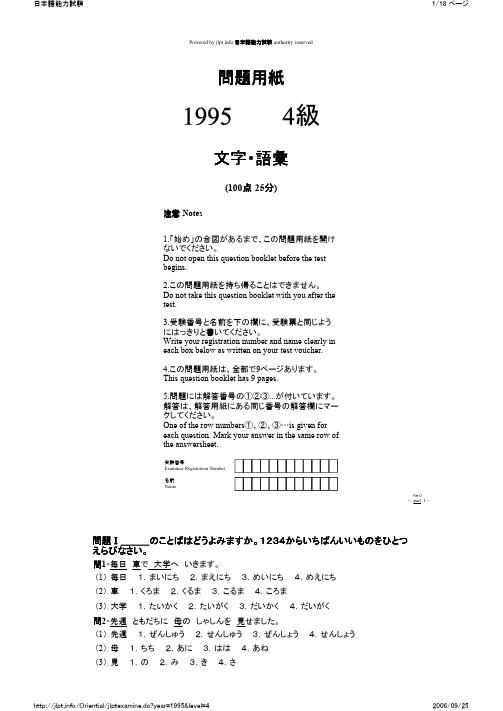
1.きょうの じゅぎょうは 9じ10ぷんに はじまりました。 2.きょうの じゅぎょうは 9じ20ぷんに はじまりました。 3.きょうの じゅぎょうは 9じ30ぷんに はじまりました。 4.きょうの じゅぎょうは 9じ40ぷんに はじまりました。
受験番号 Examinee Registration Number 名前 Name
ページ
-- part 1 --
問題Ⅰ___のことばはどうよみますか。1234からいちばんいいものをひとつ えらびなさい。
問1・毎日 車で 大学へ いきます。 (1).毎日 1.まいにち 2.まえにち 3.めいにち 4.めえにち (2).車 1.くろま 2.くるま 3.こるま 4.ころま (3).大学 1.たいかく 2.たいがく 3.だいかく 4.だいがく
2006/09/25
日本語能力試験
6/18 ページ
1. 2. 3. 4. 問(4).
1. 2. 3. 4.
問(5).
/Oriential/jlptexamine.do?year=1995&験
7/18 ページ
1. 2. 3. 4. 問(6).
6.テープを聞きながら、この問題用紙にメモをとってもかまいません。 Youmaymakenotesinthisquestionbooklet.
受験番号 Examinee Registration Number
名前 Name
ページ
-- part 2 --
問題Ⅰ
例(0).
/Oriential/jlptexamine.do?year=1995&level=4
年大学日语四级考试试题最新精选
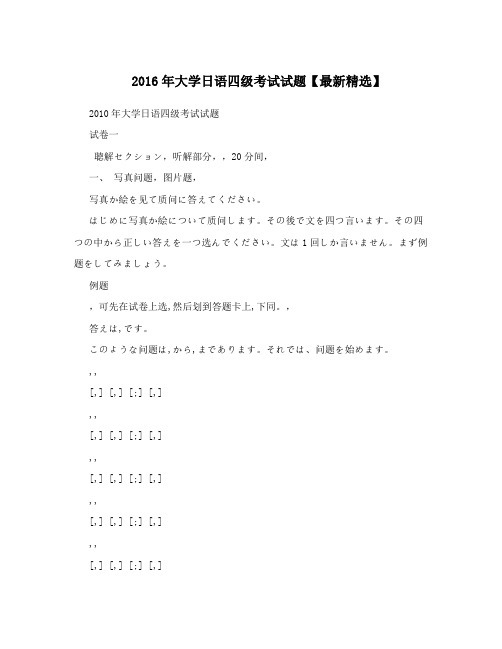
2016年大学日语四级考试试题【最新精选】2010年大学日语四级考试试题试卷一聴解セクション,听解部分,,20分间,一、写真问题,图片题,写真か絵を见て质问に答えてください。
はじめに写真か絵について质问します。
その後で文を四つ言います。
その四つの中から正しい答えを一つ选んでください。
文は1回しか言いません。
まず例题をしてみましょう。
例题,可先在试卷上选,然后划到答题卡上,下同。
,答えは,です。
このような问题は,から,まであります。
それでは、问题を始めます。
,,[,] [,] [;] [,],,[,] [,] [;] [,],,[,] [,] [;] [,],,[,] [,] [;] [,],,[,] [,] [;] [,]二、忚答问题,应答题,始めに一人が短い文を一つ言う。
その後でもう一人がそれに答える。
正しい答えを[,][,][;][,]から、一つ选んでください。
文は一回しか言いない。
まず例题をしてみよう。
例题[,] [,] [;] [,]答えは,です。
このような问题は,から10まであります。
それでは、问题を始めます。
,,[,] [,] [;] [,] ;,[,] [,] [;] [,] ,,[,] [,] [;] [,] ,,[,] [,] [;] [,] 10,[,] [,] [;] [,]三、会话问题,对话题,会话を闻いて、质问に答えてください。
质问は会话を闻く前と闻いた後,回言います。
正しい答えを[,][,][;][,]から、一つ选んでください。
会话は一回しか言いません。
まず例题をしてみましょう。
例题[,] 水曜日 [,] 木曜日[;] 金曜日 [,] 土曜日答えは,です。
このような问题は11から20まであります。
それでは、问题を始めます。
11,[,]9月2日 [,]9月6日 [;]9月7日 [,]9月20日 12,[,],时 [,];时 [;],时 [,],时 13,[,]夜 [,]昼 [;]朝 [,]夕方14,[,]赤 [,]黒 [;]白 [,]茶色15,[,] [,] [;] [,]16,[,] [,] [;] [,]17,[,]水泳 [,]登山 [;]テニス [,]スキー 18,[,]伞 [,]帽子 [;]弁当 [,]かばん 19,[,]バスで帰ります [,]电车で帰ります [;]歩いて帰ります [,]タクシーで帰ります20,[,]东口 [,]西口 [;]南口 [,]北口文字と语汇セクション,20分间,一、次ののことばの読み方を、それぞれ[,][,][;][,]から一つ选びなさい。
1995年日语四级文字词汇阅读文法
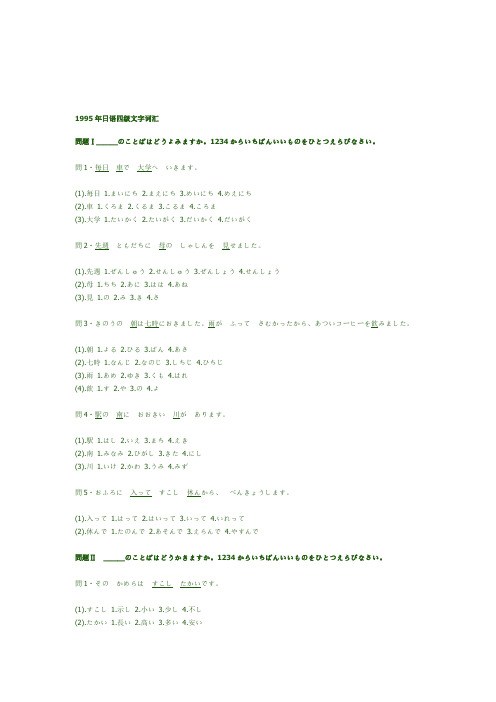
1995年日语四级文字词汇問題Ⅰ___のことばはどうよみますか。
1234からいちばんいいものをひとつえらびなさい。
問1・毎日車で大学へいきます。
(1).毎日1.まいにち2.まえにち3.めいにち4.めえにち(2).車1.くろま2.くるま3.こるま4.ころま(3).大学1.たいかく2.たいがく3.だいかく4.だいがく問2・先週ともだちに母のしゃしんを見せました。
(1).先週1.ぜんしゅう2.せんしゅう3.ぜんしょう4.せんしょう(2).母1.ちち2.あに3.はは4.あね(3).見1.の2.み3.き4.さ問3・きのうの朝は七時におきました。
雨がふってさむかったから、あついコーヒーを飲みました。
(1).朝1.よる2.ひる3.ばん4.あさ(2).七時1.なんじ2.なのじ3.しちじ4.ひちじ(3).雨1.あめ2.ゆき3.くも4.はれ(4).飲1.す2.や3.の4.よ問4・駅の南におおきい川があります。
(1).駅1.はし2.いえ3.まち4.えき(2).南1.みなみ2.ひがし3.きた4.にし(3).川1.いけ2.かわ3.うみ4.みず問5・おふろに入ってすこし休んから、べんきょうします。
(1).入って1.はって2.はいって3.いって4.いれって(2).休んで1.たのんで2.あそんで3.えらんで4.やすんで問題Ⅱ___のことばはどうかきますか。
1234からいちばんいいものをひとつえらびなさい。
問1・そのかめらはすこしたかいです。
(1).すこし1.示し2.小い3.少し4.不し(2).たかい1.長い2.高い3.多い4.安い問2・ドゕのみぎにでんきにすいっちがあります。
(1).みぎ1.右2.石3.後4.戸(2).でんき1.電気2.天気3.電器4.電機(3).すいっち1.スイッテ2.ネイッテ3.スイッチ4.ヌイッチ問3・いつもここでしんぶんをかいます。
(1).しんぶん1.新文2.新分3.新聞4.新本(2).か1.員2.貿3.貸4.買問4・らいげつのむいかにともだちがきます。
日语四级听力材料
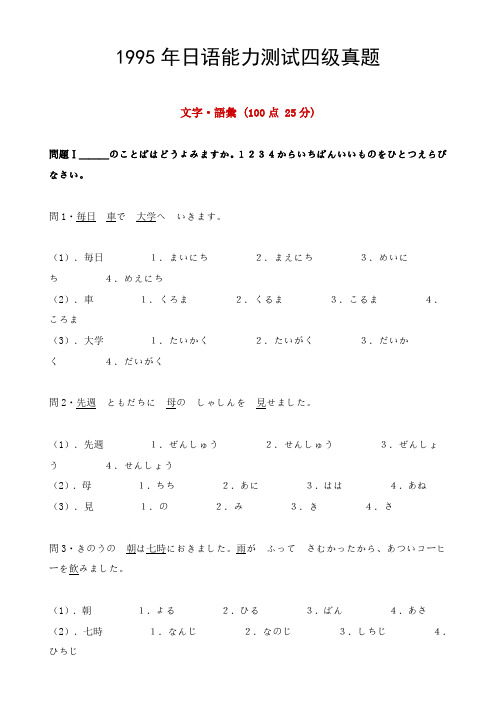
文字·語彙(100点25分)
問題Ⅰ___のことばはどうよみますか。1234からいちばんいいものをひとつえらびなさい。
問1・毎日車で大学へ いきます。
(1).毎日1.まいにち2.まえにち3.めいにち4.めえにち
(2).車1.くろま2.くるま3.こるま4.ころま
(3).大学1.たいかく2.たいがく3.だいかく4.だいがく
問(2)A「おそく なって ごめんなさい。」
b「___。」
1.おかげさまで2.どう いたしまして3.おねがいします4.どうぞ よろしく
問(3)A「それでは また らいしゅう。」
B「____。」
1.さようなら2.こんにちは3.いらっしゃい4.はじめまして
問(4)あ「あしたは じしょを わすれないで ください。」
問4・らいげつのむいかに ともだちがきます。
(1).むいか1.八日2.九日3.三日4.六日
(2).き1.来2.木3.気4.行
問題Ⅲ______のところになにをいれますか。1234からいちばんいいものをひとつえらびなさい。
(1).つぎの かどを みぎに______。
1.まがります2.わたります3.のぼります4.とまります
(2).______を しめて かいしゃへ いきます。
1.セーター2.シャツ3.ズボン4.ネクタイ
(3).すずきさんの じでんしゃは______きれえいです。
1.いそがしくて2.わかくて3.あたらしくて4.あつくて
(4).いっしゅかんに______テニスを します。
1.さんかい2.さんばん3.さんがい4.さんぼん
(5).えいがかんの まえに みせが______ならんで います。
- 1、下载文档前请自行甄别文档内容的完整性,平台不提供额外的编辑、内容补充、找答案等附加服务。
- 2、"仅部分预览"的文档,不可在线预览部分如存在完整性等问题,可反馈申请退款(可完整预览的文档不适用该条件!)。
- 3、如文档侵犯您的权益,请联系客服反馈,我们会尽快为您处理(人工客服工作时间:9:00-18:30)。
1995年大学日语四级考试Ⅰ聴解聴解試験はすべて録音されたテープを聞きながら行われます。
一、次の短い会話を聞きなさい。
答えは選択肢A.B.C.Dの中から最も適切なものを一つ選び、解答用紙のその記号に印をつけなさい。
問題例テープの内容女:きょうもまた残業ですか。
男:いえ、きょうはこの仕事が終わったら帰ります。
友達と食事の約束がありますから。
問:男の人はどういうことを言っていますか。
女:今天也要加班吗?男:不,等这件事做完后就回去。
我已约好和朋友吃晚饭。
提问:这男子说了什么事?A.よく残業するがきょうはしないB.あまり残業はしないがきょうはするC.よく残業するのできょうもするD.あまり残業しないのできょうもしない1-10(略)二、次の内容1,2,3を聞きなさい。
答えは選択肢A.B.C.Dの中から最も適切なものを一つ選び、解答用紙のその記号に印をつけなさい。
11-20(略)Ⅱ文字と語彙一、下の文のある漢字の読み方、または文のにいれる外来語はそれぞれ選択肢A.B.C.Dの中から最も適切なものを一つ選び、解答用紙のその記号に印をつけなさい。
21.道路の横断に気を付ける。
A.おうたんB.こうたんC.おうだんD.こうだん22.教育の見地から見れば好ましくない。
A.みちB.みじC.けんちD.けんじ23.夜中になって風はますます強くなった。
A.よなかB.やなかC.よちゅうD.やちゅう24.芝生の中に入るべからず。
A.しせいB.ししょうC.しばいD.しばふ25.平田さんの言葉は相手を沈黙させるのに十分な力を持っている。
A.しんぼくB.しんもくC.ちんぼくD.ちんもく26.角のある動物は牛だけではない。
A. つのB.すみC.かくD.かど27.なべの中のスープが湯気を立てた。
A.ゆげB. ゆきC.とうげD.とうき28.有無を言わせず、味方に引き入れる。
A. みほうB.みぼうC. みかたD.みがた29.地震の影響でこの沿岸一帯は津波に襲われる危険がある。
A.しんなみB.つなみC. しんはD.つは30.音楽に優勝する。
A.コーンクールB.コンクールC.コーンクルD.コンクル二、下の文の下線をつけたことばの二重線のある部分はどのような漢字を書くか、答えは選択肢A.B.C.Dの中から同じ漢字を使われるものを一つ選び、解答用紙のその記号に印をつけなさい。
31.この製品はまだ特定のちいきでしか発売されていない。
A.さんち直送だから、新鮮でおいしい。
B.病気のちりょうにはずいぶん費用がかかった。
C.ニュースは、「新しい」というところにかちがある。
D.みんなでちえを出し合えば、何かうまい考えが浮かぶだろう。
32.それが公害によるものだということは、今ではめいりょうな事実だ。
A.親切も度がすぎると、かえってめいわくなこともある。
B.切符を渡しますから、入場の際にはめいめいでお持ちください。
C.その島では、空も海も鮮やかに青くとうめいだ。
D.彼は大した仕事もせず、ゆうめい無実の会長だ。
33.一度ようりょうを覚えてしまえば、こんなの簡単さ。
A.いかにもとうようてきで、上品なインドの女性と知り合った。
B.意外な出来事に、私は心のどうようを隠し切れなかった。
C.買ってから一年も経つのに、新品どうようの輝きを持っている。
D.これでこの会のしゅようなメンバーは集まった。
34.二人の間には意見のそういがある。
A. 各種の問題をそうごうして考える。
B.警察は犯人の徹底的そうさを開始した。
C.どんなことになるか、ちょっとそうぞうもつきません。
D.そうばは毎日変わるから、注意して見ていなければならない。
35.上がり続けた土地の値段もこのあたりがてんじょうだろう。
A.山はてんこうの変化がはげしいので、注意が必要だ。
B.車は定期的にてんけんするように決められている。
C.百科じてんには何でものっていると思うのはまちがいだ。
D.作者は主人公の側に立って物語をてんかいしているのだ。
三、下の文のに入れる言葉は選択肢A.B.C.Dの中から最も適切なものを一つ選び、解答用紙のその記号に印をつけなさい。
36.仕事がどんなに苦しくても、やっていくがありますか。
A.覚悟B.考慮C.企画D.思想37.では、皆さんのごにこたえてもう一曲歌います。
A.希望B.請求C.要求D.要望38.私はこれまで誰の力も借りず自分で自分の道をきました。
A. あいてB.あけてC.ひらいてD.ひらけて39.この本は4ページもいたので、本屋で換えてもらった。
A.壊してB.壊れてC.抜いてD.抜けて40.仕事に精をのはいいが、あまり働き過ぎないよう。
A.与えるB.入れるC.するD.出す41.目を閉じて一本足でバランスをのは難しい。
A.うけるB.かけるC.するD.とる42.きのうの試合はたった1点の差で負けてしまって、私はとてもかった。
A.ひどB.苦しC.くやしD.もったいな43.郵便小包は扱われても壊れないように作っておかなければならない。
A.乱暴にB.不意にC.無駄にD.冷たく44.この手紙は書いてあるから、外国人にとっては分かりやすい。
A.省略してB.くわしくC.やさしくD.ながく45.あの注射をしたら、病状が悪くなった。
A.急いでB急に. C.快く D.大急ぎで46.この言葉は知りませんが、文の意味は分かります。
A.大体B.全体C.大変D.全く47.彼女はいつも7時に来るからもう来るでしょう。
A.いよいよB.そろそろC.やっとD.とうとう48.一時間も待ったが、彼女は姿を見せなかった。
A.さっぱりB.思わずC.うっかりD.ついに49.恋人どうしはお互いの手紙がくるのを待ち。
A.がたいB.かねるC.づらいD.にくい50.彼は高校に入ってから成績が目によくなった。
A.余ってB.付いてC.入ってD.見えてⅢ.文法と構文下の文の入れることばを選択肢A.B.C.Dの中から最も適切なものを一つ選び、解答用紙のその記号の印をつけなさい。
51.ある日、友達と一緒にバスケットボール遊んでいた。
A.でB.にC.とD.を52.あなた読んでしまったら、私に貸してください。
A.がB.はC.もD.から53.すみませんが、用が行けませんでした。
A.あるからB.あるのでC.あってD.あったり54.なれない物を食べすぎた、おなかをこわしてしまった。
A.だけB.だけにC.ばかりD.ばかりに55.「あれ、ペンはどこへ行ったんだろう。
」「ほら、そこにある。
」A.ねB.よC.のD.かな56.それは、待ち待った彼女からの便りだった。
A.をB.もC.にD.は57.読み、その本を持って行ってもいいよ。
A.たがるとB.たがればC.たいとD.たければ58.ほかの人は休んでいるのに、私は忙しくて、休めない。
A.休んでB.休もうとC.休もうにもD.休もうとも59.急がないから、今度時に返してくれればいいです。
A.会うB.会ったC.会っておくD.会っている60.私たちが夕飯を食べているところに彼女の電話が。
A.かかっていたB.かかってきたC.かかっていったD.かかってしまった61.けがをした彼は病院に。
A.運んでいったB.運んでいかれたC.運ばれていったD.運ばれていかれた62.「どこがいいですか。
」「そうですね、私は新宿にしてとありがたいんですが。
」A.あげるB.やるC.みるD.もらえる63.ほら、眼鏡を先生がいたでしょう。
A.かけるB.かけたC.かけておくD.かけてある64.太るだ。
毎日こんなにたくさん食べているのだから。
A.わけB.つもりC.ものD.こと65.もう仕事は終わっただ。
だけと、なぜ帰って来ないのだろう。
A.ときB.ところC.はずD.つもり66.「週末だから、明日は込むかもしれませんよ。
」「給料日のあとですしね。
」A.それではB.それにC.それならD.それでも67.友達だからって、そんなこと言ったら失礼ですよ。
A.いくらB.どうしてもC.どうしてD.なぜなら68.して戦争のない世界を作るか、これが人類の課題だ。
A.いかがB.いかにC.どうにかD.どれほど69.絶対に秘密だと言っておいたのに、花子人にしゃべってしまって、困ったものだ。
A.ときたらB.にきたらC.としたらD.にしたら70.「彼のことはご存じですか。
」「はい、私は。
」A.存じますB.存じですC.ご存じますD.存じておりますⅣ.読解下の文章(イ)を読んで71-76の問いに、文章(ロ)を読んで77-82の問いに、文章(ハ)を読んで83-90の問いにそれぞれ答えなさい。
答えはそれぞれ選択肢A.B.C.Dの中から最も適切なものを一つ選び、解答用紙のその記号に印をつけなさい。
文章(イ)何年か前に、日本政府が行なった外国人に対する態度の世論調査(71)の結果が外国で報道され、多くの人の関心を集めた。
この報道によると、「日本人の大多数は、外国人と交際をもつことを好まない」そうである。
日本人の何パーセントが、自分の子供が外国人と結婚することになれば反対するかとか、自分の家の近くに外国人が住んでも、交際したくないかとか、種々の生活態度に関するアンケート調査(=问卷调查)の結果である。
どの数字も高い(72)。
一体、日本人は特に外国人嫌いの民族なのであろうか。
国際的な規模で比較できるような資料はない。
しかし、そのような比較の可能性があれば、おそらくどの国でも驚くほど「嫌いだ」、あるいは「警戒すべきだ」(73)という態度が明らかになるのではないだろうか。
まず、日本に滞在している外国人を調査の対象にしたら、彼らにとって「外国人」である日本人の評判は必ずしも、先にあげた調査と変わるものではないであろう。
なお、日本の外務省が、近年、世界の数か国で行なった日本に関する世論調査の結果を見ると、日本人に対する否定的な評価、日本人についての不評判などが、驚くほど多いということが分かる。
しかも、同じ調査から、日本人よりも、さらに嫌われる民族があることも推定できる。
つまり、国際社会全体の視点をとると、外国人を嫌うのは、日本人の特色であるとか、日本人が他の民族よりもはるかに嫌われるということは言えない。
外国人は外国人である限り、好まれないものである。
最初のところで触れたように、この態度(75)は外国人の努力にとって変えることのできない場合もあるし、明らかに外国人の罪悪の結果だという場合もある。
時代、そして具体的な事情によって、多少の違いがあるかもしれないが、基本的には、外国人への態度は、少なくとも最近までは、どの社会でも、否定的なものである。
71.「世論調査」の対象はどういう人か。
A.日本国内にいる日本人B.日本にいる外国人C.外国にいる日本人D.日本人と結婚した外国人72.「どの数字も高い」とあるが、どういうことか。
